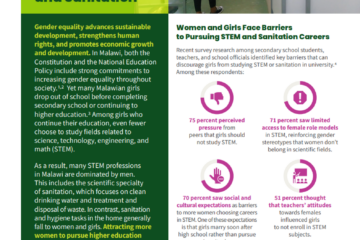
We make the care economy visible, helping policymakers recognize care work as an engine of economic growth, advancement, and equity.
Why It Matters
The care economy includes all the paid and unpaid work that goes into caring for children, older adults, people with disabilities, and households. It covers formal sectors such as childcare centers, nursing homes, and home health services. But it also includes the countless hours of unpaid care, often provided by women in families and communities, that keep households running and societies strong. Despite its importance, much of this labor is left out of traditional measures like the GDP. Yet its value is immense, representing trillions of dollars globally. Without data to capture and communicate that value, care remains invisible in economic planning.
The omission of care work is not only a statistical issue but also a policy one. Because it is invisible in planning and budgeting decisions, governments underinvest in infrastructure and services, leaving families to absorb the costs. Population aging, rising life expectancy, and growing needs for dementia and eldercare are converging with continued childcare demands. Few societies — including the U.S. — have built the infrastructure to meet this double challenge. Without investment and planning, this is not just an “equity” issue but a looming care crisis that threatens social protection systems and economic stability. That’s where PRB comes in.
How We Drive Change
PRB shines a light on the economic and societal function of care work. Through research, partnerships, and larger initiatives like Counting Women’s Work, we help ensure caregiving is visible, valued, and integrated into economic decisionmaking. Our work includes:
- Communicating the economic value and societal function of care work to drive evidence-based policy dialogue and to give policymakers and advocates the information they need to support policies that advance equity and opportunity.
- Building global and regional partnerships to embed caregiving into demographic and economic planning at national and international levels.
- Educating the public to build broad awareness of the value and function of care, creating demand for policy change.
- Empowering women leaders and challenging harmful gender narratives by ensuring women’s perspectives shape policy debates and solutions.
- Turning complex data into clear insights so leaders can make informed choices about budgets, investments, and protections that shape daily life.
- Elevating care on the agenda by convening leaders, journalists, and advocates to keep caregiving central to policy debates.
Powering Policy with Data
Counting Women’s Work
Across West Africa, through our longtime partnership with CREG in Thiès, Senegal, PRB has promoted research findings that help demonstrate the value and function of unpaid care. This evidence is informing policy debates on gender equity, labor markets, and economic policy, supporting decisions account for the hidden contributions of women.
With support from PRB and CREG, African technical experts and analysts co-created the first French-language policy dialogue guide on unpaid care, ensuring that evidence can be effectively used in policymaking processes. This tool is now being used by leaders and civil society to shape national policy dialogues on integrating unpaid care into public policies. Today, PRB is developing complementary resources on child care and other relevant issues to help policymakers analyze and understand the legal, policy, and programmatic environment around unpaid care and advance evidence-based reform. By collaborating with stakeholders across sectors, and prioritizing locally led solutions, we are gradually building an effective and sustainable process for data-driven policy dialogue—a historic step for the region.
In Senegal, PRB and CREG turned research into action, helping shape a national roadmap that makes unpaid care part of public policy. We are also partnering with RENAFETS, a union of working women, to advance legislation on workplace childcare—across both the formal and informal sectors—as a tool for women’s economic empowerment, backed by policy briefs and scorecards to hold leaders accountable.
In Togo, by equipping civil society and parliamentarians with evidence, PRB is helping embed unpaid care into national reforms. This work is making care visible not only as a political priority, but also by highlighting its economic and social function—taking it out of the private sphere and demonstrating its impact on economic growth and the corresponding responsibility of governments – opening the door to policies that better support women.
In the United States, PRB convened policymakers, advocates, and researchers in a national webinar exploring the idea of women as America’s safety net. The discussion helped move care into the policy spotlight by framing it as essential infrastructure and sparking new conversations about how to fund and strengthen caregiving systems.
Making Care Count
At PRB, we believe that population data must serve the people it describes. Care is not only a matter of fairness—it is a demographic and economic necessity. In countries with an opportunity to seize the demographic dividend, investing in care enables women’s participation in the labor force and supports human capital development for the next generation. In aging societies, care is essential infrastructure to sustain productivity and social protection systems. Across contexts, unpaid and paid care form the backbone of social and economic resilience. By working with generational economists and translating their findings into policy communication, PRB demonstrates that care is a driver of growth, equity, and sustainability—and that governments cannot afford to ignore care when planning for the future.
Let us support you in advancing the value of care work.





